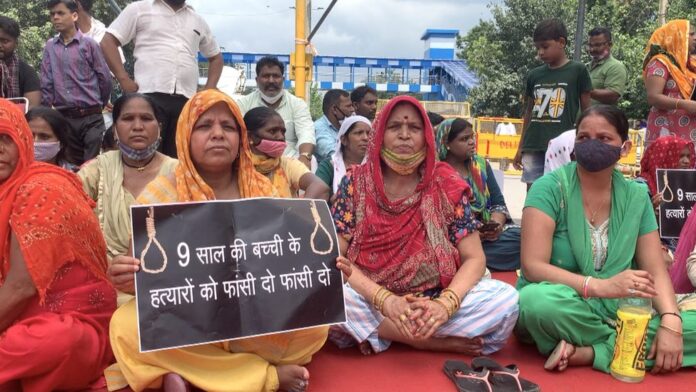
Protests are continuing for the fourth day over the alleged gang rape, murder and forced cremation of a nine-year-old girl in the Indian capital, Delhi.
The girl’s parents have accused a Hindu priest and three others of attacking her when she had gone to fetch drinking water from the crematorium’s cooler.
Her mother said the gates were shut and she was threatened when she objected to her daughter’s cremation.
Police have registered a case of gang rape and murder and arrested the men.
Warning: some readers may find this story distressing.
The girl’s parents are Dalits – formerly untouchables – who make a living by begging outside a Sufi Muslim shrine located just across from the cremation ground in Delhi’s Nangal area. The girl was their only child.
Her mother told me that on Sunday evening, she had sent her daughter to fetch water from the crematorium, just a few metres from their shanty.
“When she didn’t return for over an hour, I went searching for her. At the crematorium, I found her lying on the ground. Her lips were blue, there was blood under her nose, she had bruises on her hands and arms and her clothes were wet.”
She said the priest and the three men advised her not to call the police, saying “they would insist on an autopsy and steal her organs and sell them”.
- Instagram makes under-16 accounts private by default
- Teodoro Nguema Obiang Mangue and his love of Bugattis and Michael Jackson
She alleged that they shut the gates to prevent her from leaving, threatened her and even offered to bribe her.
The child’s father said that by the time he, along with about 150 villagers, reached the crematorium, their daughter’s body was mostly burned.
The villagers said they called the police and doused the pyre with water, but could only retrieve her legs – which means a post mortem exam to confirm rape would not be possible.
A senior police official said that based on the information from the parents, a case of gang rape, murder and forced cremation had been registered against the accused.

The incident is drawing comparisons with last year’s alleged gang rape and murder of a Dalit teen by four upper-caste men in the town of Hathras in the northern state of Uttar Pradesh. That incident had caused global outrage after police forcibly cremated her body despite her family’s protests.
Dalits, who are placed at the bottom of the unforgiving Hindu caste hierarchy, remain among India’s most downtrodden citizens.
A large majority of the 200 million Dalits are poor and despite laws to protect them, they continue to be subjected to daily discrimination from the upper castes and the authorities.
And Dalit women face the triple burden of poverty, gender bias and caste discrimination.
On Wednesday, hundreds of protesters gathered outside the Nangal cremation ground, demanding the death penalty for the accused.
They also called for some local police officials to be suspended, accusing them of harassing the victim’s family.
Delhi Chief Minister Arvind Kejriwal and senior leader of the opposition Congress Party Rahul Gandhi visited the child’s family and offered to help them get justice.
Protesters from the Congress burnt an effigy of Prime Minister Narendra Modi, accusing him of not condemning the crime.
Over the past few days, leaders from the Dalit community have participated in the protests and activists and citizens have taken to social media to express outrage.
Some have already dubbed it a caste crime – as the accused priest is reported to be an upper-caste Brahmin.
Since the 2012 gang rape and murder of a young woman on a bus in Delhi, rape and sexual violence have been under the spotlight in India.
That attack saw days of protests and forced changes to the country’s rape laws, but there has been no sign of crimes against women and girls abating.
According to recent crime figures, every fourth rape victim in India is a child. In an overwhelming number of rape cases, the victims know the perpetrators.
SOURCE: BBC NEWS




